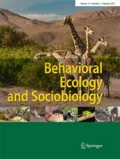Summary
Wild short-toed tree creepers in southern Germany were exposed to tape recordings of seven song types from other dialects or song institutions and sixteen song types from thirteen handreared Middle European birds. One song type from southern Germany was used as a control. The males reacted strongly to two slightly different Spaish dialects and not at all or only feebly to one song institution from Cyprus and four from Morocco. The song types of the hand-reared birds had less effect than controls. The songs of two birds from southern Germany hand-raised together were quite similar to those from Cyprus. We conclude that Cyprus and North Africa on the outskirts of the species distribution were colonized by short-toed tree creepers who had had no opportunity to learn their songs from adult conspecifics.
Similar content being viewed by others
References
Adkisson CS (1981) Geographic variation in vocalizations and evolution of North American Pine Grosbeaks. Condor 83:277–288
Baker MC (1975) Song dialects and genetic differences in White-crowned Sparrows (Zonotrichia leucophrys). Evolution 29:226–241
Baker MC (1982) Genetic population structure and vocal dialects in Zonotrichia (Emberizidae). In: Kroodsma DE, Miller EH (eds) Acoustic communication in birds, vol 2. Academic Press, New York, pp 209–235
Baptista LF (1976) Song dialects and demes in sedentary populations of the White-crowned Sparrow (Zonotrichia leucophrys nuttalli). Univ Calif Publ Zool 105:1–53
Baptista LF (1977) Geographic variation in song and dialects of the puget sound White-crowned Sparrow. Condor 79:356–370
Baptista L, Johnson RB (1982) Song variation in insular and mainland California Brown Creeper (Certhia familiaris) J Ornithol 123:131–144
Becker PH (1977) Verhalten auf Lautäußerungen der Zwillingsart, interspezifische Territorialität und Habitatan-sprüche von Winter-und Sommergoldhähnchen (Regulus regulus, R. ignicapillus). J Ornithol 118:233–260
Becker PH, Thielcke G, Wüstenberg K (1980) Versuche zum angenommenen Kontrastverlust im Gesang der Blaumeise (Parus caeruleus) auf Teneriffa. J Ornithol 121:81–95
Bergmann H-H (1983) Some peculiarities of Cyprus bird voices. Cyprus Ornithol Soc 8. Bird Report 1977, Nicosia
Brehm CL (1820) Der kurzzehige Baumläufer. Beitr Vögelkd 1:570–587
Brown RN, Lemon RE (1980) The effect of sympatric relatives on the evolution of song. XVII Congr Int Ornithol 1:742–747
Chappuis C (1976) Origine et évolution des vocalisations de certains oiseaux de Corse et des Baleares. Alauda 44:475–495
Grant PR (1975) The classical case of character displacement. Evol Biol 8:237–337
Hunter ML Jr, Krebs JR (1979) Geographical variation in the song of the Great Tit (Parus major) in relation to ecological factors. J Anim Ecol 48:759–785
Krebs JR, Kroodsma DE (1980) Repertoires and geographical variation in bird song. Adv Study Behav 11:143–177
Kroodsma DE (1974) Song learning dialects, and dispersal in the Bewick's Wren. Z Tierpsychol 35:352–380
Lack D, Southern HN (1949) Birds on Tenerife. Ibis 91:607–626
Lemon RE (1975) How birds develop song dialects. Condor 77:385–406
Marler P (1960) Bird songs and mate selection. In: Lanyon WE, Tavolga WN (eds) Animal sounds and communication. Am Inst Biol Sci Publ 7:348–367
Marler P, Boatman DJ (1951) Observations on the birds of Pico, Azores, Ibis 93:90–99
Marler P, Tamura M (1962) Song “dialects” in three populations of White-crowed Sparrows. Condor 64:368–377
Martens J, Hänel S (1981) Gesangsformen, und Verwandtschaft der asiatischen Zilpzalpe Phylloscopus collybita abietinus and Ph.c. sindianus. J Ornithol 122:403–427
Mayr E (1963) Animal species and evolution. Harvard University Press, Cambridge, Mass
Mirsky EN (1976) Song divergence in Hummingbird and Junco populations on Guadalupe Island. Condor 78:230–235
Mundinger P (1975) Song dialects and colonization in the House Finch, Carpodacus mexicanus, on the East Coast. Condor 77: 407–422
Mundinger PC (1982) Microgeographic and macrogeographic variation in acquired vocalizations of birds. In: Kroodsma DE, Miller EH (eds) Acoustic communication in birds, vol 2. Academic Press, New York, pp 147–208
Nottebohm F (1969) The song of the Chingolo, Zonotrichia capensis, in Argentina: description and evaluation of a system of dialects. Condor 71:299–315
Payne RB (1978) Microgeographic variation in songs of Splendid Sunbird Nectarinia coccinigaster: population phenetics, habitats, and song dialects. Behaviour 65:282–308
Payne RB (1981) Population structure and social behavior: Models for testing the ecological significance of song dialects in birds. In: Alexander RD, Tinkle DW (eds) Natural selection and social behaviour. Chiron, New York, pp 108–120
Payne RB (1982) Ecological consequences of song matching: Breeding success and intraspecific song mimicry in Indigo buntings. Ecology 63:401–411
Selander RK (1971) Systematics, and speciation in birds. In: Farner DS, Kings JR, Parkes KC (eds) Avian biology, vol 1. Academic Press, New York London
Streseman E (1919) Über die europäischen Baumläufer Verh Omithol Ges Bavern 14:39–74
Thieldke G (1961) Stammesgeschichte und geographische Variation des Gesanges unserer Baumläufer (Certhia familiaris L. und Certhia brachydactyla Brehm). Z Tierpsychol 18:188–204
Thieldke G (1965) Gesangsgeographische Variation des Garten-baumläufers (Certhia brachydactyla) im Hinblick auf das Artbildungsproblem. Z Tierpsychol 22:542–566
Thieldke G (1969) Geographic variation in bird vocalizations. In: Hinde Bird vocalizations. Aberdeen University Press, Cambridge
Thielcke G (1970) Lernen von Gesang als möglicher Schrittmacher der Evolution. Z Zool Syst Evolutionsforsch 8:309–320
Thielcke G (1972) Waldbaumläufer (Certhia familiaris) ahmen artfremdes Signal nach und reagieren darauf. J Ornithol 113:287–296
Thielcke G (1973) On the origin of divergence of learned signals (songs) in isolated populations. Ibis 115:511–516
Thielcke G (1983) Entstanden Dialekte des Zilpzalps Phylloscopus collybita durch Lernentzug? J Ornithol 124:333–368
Thielcke G (1984) Gesangslernen beim Gartenbaumläufer Certhia brachydactyla Vogelwarte 32:282–297
Thielcke G, Wüstenberg K, Becker PH (1978) Reaktionen von Zilpzalp und Fitis (Phylloscopus collybita, Ph. trochilus) auf verschiedene Gesangsformen des Zilpzalps. J Ornithol 119:214–226
Wiens JA (1982) Song pattern variation in the Sage Sparrow (Amphispiza belli): Dialects or epipheomena? Auk 99:208–229
Williamson M (1981) Island Populations. Oxford University Press, Oxford
Author information
Authors and Affiliations
Rights and permissions
About this article
Cite this article
Thielcke, G., Wüstenberg, K. Experiments on the origin of dialects in the short-toed tree creeper (Certhia brachydactyla). Behav Ecol Sociobiol 16, 195–201 (1985). https://doi.org/10.1007/BF00310981
Received:
Accepted:
Issue Date:
DOI: https://doi.org/10.1007/BF00310981




